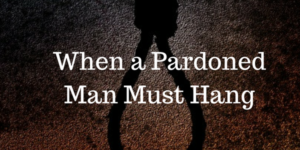In 1833, George Wilson was convicted of robbing a mail carrier in Pennsylvania, and sentenced to hang. However, the case caught the attention of President Andrew Jackson, and Jackson granted Wilson a pardon. Surprisingly, Wilson refused it, and argued that he was not pardoned if he refused to be pardoned. The state’s attorney found that the law was silent on this point, and so the case was carried to the United States Supreme Court.
John Marshall, the Chief Justice of the Supreme Court, wrote in his opinion: “A pardon is a deed, to the validity of which delivery is essential, and delivery is not complete without acceptance. It may then be rejected by the person to whom it is tendered; and if it be rejected, we have discovered no power in a court to force it on him.” Marshall ruled that George Wilson must be hanged, because he refused the writ of pardon.
There are a number of striking parallels between how Wilson stood before United States law and how every sinner stands before God. Consider the following:
- Every sinner’s pardon has been offered to him. Christ died in the place of every sinner so that he would not have to suffer the penalty for sin—eternal destruction in hell. The Bible says, “But we see him who for a little while was made lower than the angels, namely Jesus, crowned with glory and honor because of the suffering of death, so that by the grace of God he might taste death for everyone” (Hebrews 2:9).
- The message about every sinner’s pardon has been written. The New Testament contains the explanation of the pardon and the terms whereby it may be accepted. The Bible says, “For I am not ashamed of the gospel, for it is the power of God for salvation to everyone who believes” (Romans 1:16).
- The message about every’s sinner’s pardon must be delivered to him. If a sinner never finds out about his pardon, he cannot accept it. The Bible says, “For ‘everyone who calls on the name of the Lord will be saved.’ How then will they call on him in whom they have not believed? And how are they to believe in him of whom they have never heard? And how are they to hear without someone preaching?” (Romans 10:11-14).
- Every sinner may reject his pardon. If a sinner rejects his pardon, he will suffer the penalty despite Christ’s offer. The Bible says, “[H]ow shall we escape if we neglect such a great salvation?” (Hebrews 2:3).

